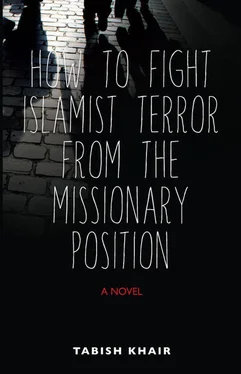Hold nu op, retorted Little Claus with gruff affection. Then both of them looked embarrassed and switched the topic to the political situation in Libya.
The phone rang a few minutes after the two Clauses had left, carrying the bottle and glasses back with them. I picked it up. It was a woman’s voice, asking for Karim. It sounded very Danish. I replied that Karim was not back yet from his shift.
The woman repeated her question, as if she had not heard me. Can I… can I speak to Karim, she said in Danish.
As my Danish is far from perfect and Ravi speaks the language with flourish, I handed the receiver to him. He repeated what I had said in an accent that, I was convinced, would have been easy to follow even for a Dane living in some remote fishing village off the coasts of Jutland.
But I could hear that the woman did not understand.
“I want to speak to Karim,” she almost sobbed.
Then, as Ravi started to repeat his answer, she disconnected the line.
Once, the two Clauses knocked on a Friday evening, just before Karim’s Quranic session was to begin. Usually Karim turned people away during these sessions, unless they were part of his discussion group. But he let the Clauses in. It indicated to me how close he felt to these two bearded men who had spent most of their vacations treating poor people in remote villages of Asia and Africa.
But when Great Claus wanted to hold the Quran—in Arabic, Urdu and English—that Karim passed around and referred to, Karim apologetically pulled it away. “It is a holy book, Claus, if I may,” he said in Danish. “You should be clean before you can hold it.”
It was then that I realized, for the first time, that Karim had never let me or Ravi touch his Quran either. Ravi because he was, despite his interest in the religion, not a Muslim and me because, in Karim Bhai’s eyes, I had sullied myself with alcohol, non-halal food and probably—he was right in suspecting—I did not perform the ritual stinja cleansing every time I pissed.
That night the two Clauses joined Ravi and me on our regular Friday night out in town. We did not have a date that Friday. We had just decided to meet some friends from the university in a café. Little Claus and Great Claus spent much of the time huddled together, talking. I overheard them discussing Great Claus’s family. At one point, Great Claus sounded irritated, and Little Claus left the table to get himself another drink from the bar.
Great Claus followed him with his beer. He put a reassuring bear-arm around Little Claus’s shoulders at the bar. The two friends stood there talking for half an hour. When we decided to move to another café, the Clauses said they would be heading home soon and stayed back.
My last sight of them that night was of two large men, both bearded, bent over their beers at the bar, conversing with a quiet intensity that is rare to observe in these parts.
LILACS OUT OF THE DEAD LAND
It had been a cold March, but April showed promise. Branches let out shoots, though still curled into themselves, chary of the chill; the sky brightened and appeared to expand a bit with the light; one could even hear birds twittering. Ravi ploughed into his PhD thesis, which was long due now, having finally abandoned the third novel that he had started since the days he quit medical studies. He had a literary reputation in India and UK: he had been anthologized by Pankaj Mishra and mentioned as “a name to watch” by Salman Rushdie, an unusual combination, almost a decade ago, and a year back he had contributed to a special number of Granta . For more than a decade, he had been rumored to be the next Vikram Seth, perhaps even the next Arundhati Roy, gender permitting. Unfortunately, he had never managed to finish a novel or a full collection of any sort. His reputation would wax and wane with a brilliant story here, a cutting essay there.
It had been a cold March, but April showed promise. Branches let out shoots, though still curled into themselves, chary of the chill; the sky brightened and appeared to expand a bit with the light; one could even hear birds twittering. Ravi ploughed into his PhD thesis, which was long due now, having finally abandoned the third novel that he had started since the days he quit medical studies. He had a literary reputation in India and UK: he had been anthologized by Pankaj Mishra and mentioned as “a name to watch” by Salman Rushdie, an unusual combination, almost a decade ago, and a year back he had contributed to a special number of Granta . For more than a decade, he had been rumored to be the next Vikram Seth, perhaps even the next Arundhati Roy, gender permitting. Unfortunately, he had never managed to finish a novel or a full collection of any sort. His reputation would wax and wane with a brilliant story here, a cutting essay there.
Still, it was an international literary reputation, if only in select circles, and I never understood why my department did not invite him for readings or talks. I had offered to set one up for him, but Ravi did not want the invitation to proceed from me. My colleagues, whenever I mentioned him, made appreciative noises; they did not send him an invitation.
Ravi had his explanation: “Almost all the tenured Brits and Yankees in English departments in Denmark, who are basically there because they are Americans and Brits, and all the Danes, who are there because they are Danes, which makes better sense to me, love multicultural literature, bastard. You know they do. We know they do. It reminds them of their great-grandparents in the colonies. Of course, they love Rushdie and Naipaul. Naipaul, Kureishi, Rushdie: why, these guys are so Indian they even speak with an English accent! That’s why people like us should write novels, yaar; imagine your colleagues wriggling in their desire to be open and their subterranean terror of us pilfering their bread-and-butter tongue, and that too in our consciously roti-and-ghee accent.”
Ravi never understood why I did not write creatively. For him, literature was an art. He often forgot that for a middle-class family like mine, it was primarily a profession. I taught English literature because I had not been good enough to get into any major medical or engineering college and my parents, university lecturers themselves (though in physics and sociology), could not afford to buy me an education. I was good enough for the less competitive humanities. I could earn a scholarship to England.
Ravi was too privileged, and education came too easily to him; he could not imagine educating himself for merely a profession. He had once told me that his father still invested in shares and bank certificates—“for tax reasons, you know, bastard”—in his name, so that he had a couple of millions waiting for him, no matter what happened. That he did not draw on them was part of his protest against his parents. But he knew the millions were there, stashed away, gathering interest or appreciating, and he was honest enough to concede that he did not feel the need to slog for a salary.
Ravi was driven by ideals that he scoffed at in public. He was driven by dreams he was openly skeptical of. He hacked his own pathways, sometimes—I felt—at the risk of slicing off a part of himself. His PhD thesis was taking longer than it should have simply because he was no longer overly interested in it. Once he had worked an idea out in his mind, Ravi seldom saw the need to continue to write it down.
He had started working on the history of fascism and Nazism in Denmark. He could be acerbic about it: “They tell you the moment you set foot here that they managed to smuggle all the Jews out of Denmark when the Nazis wanted to round them up. They forget to mention that it was a German officer who leaked the Nazis’ plans to the Danish resistance, which was largely communist and outlawed by the Danish government. They forget to tell you that the only people, apart from the poor fucking Germans, to form a full SS regiment were the good blue-eyed Danes!”
Читать дальше












